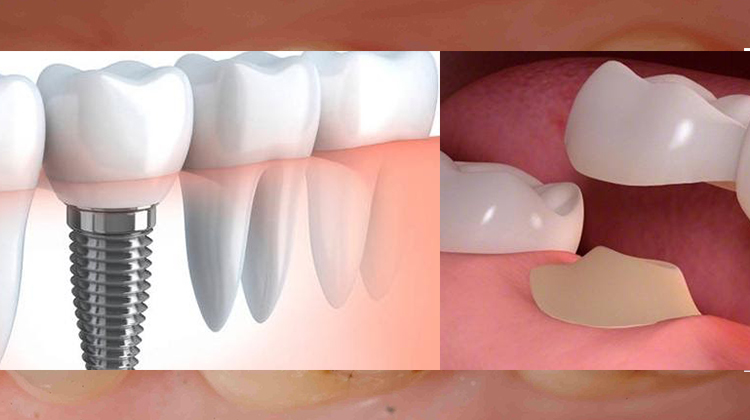
Dental Implants are metal devices that are surgically put in into the jawbone so as to replace one or more missing teeth. Implants can hold up a dental prosthesis for example a crown, bridge or a removable denture.
Dental bridge is a fixed dental prosthesis used to put back one or numerous missing teeth by permanently joining an artificial tooth to neighbouring teeth or dental implants.
You are supposed to always make the decision after consulting with your dentist. He or she will notify you regarding the diverse solutions, advantages and disadvantages to both, the dissimilarity in costs, and any risks and potential complications.
That being said, here are the most significant factors to think:
1. Cost
The cost of dental implants is the majority of the time elevated compared to a dental bridge.
Furthermore, dental implants may call for adjunctive procedures (such as sinus lift or bone graft) to augment the amount of bone that hold up the implants; these procedures will put in to the final cost.
2. Completion time
A dental bridge can be finished in two sessions; dental implants usually need more time (3 to 6 months) to blend with the bone after the surgical procedure.
Yet, in some circumstances, an implant can be placed right away after a tooth extraction, but even in this incident, a lot of practitioners will desire to put temporary restorations for a definite period of time.
3. Aesthetics
Usually, dental implants offer the most agreeable results, but an appropriately constructed ceramic bridge can also be exceedingly aesthetic.
4. Protecting the adjacent teeth
At this point , dental implants have a huge advantage as they protect natural tooth tissue by evading the need to prepare adjacent teeth. on top dental implants proffer independent support to crown and bridges, thus not putting any tension on other teeth.
Solo Tooth Gap: if a customary dental bridge is planned, the preparation of the adjacent teeth is necessary.
Single Tooth Gap: if an implant-supported crown is manufactured, the adjoining teeth stay untouched. Dental Bridges need proper preparation of the adjacent teeth. It is the major drawback of bridges as it shows the way to the loss of huge amounts of healthy tooth tissue and at times even tooth devitalization and endodontic treatment. After preparation, your natural teeth remain underneath the bridge; therefore the residual tooth structure persist to be vulnerable to decay and gum disease.
5. Maintenance
Implants are simple to maintain. They can reinstate teeth separately, devoid of affecting other teeth, making usual home care more victorious. You can efficiently brush and floss in the region of an implant just like your natural tooth.
Dental bridges entail at least three crowns coupled together to block up the space of the missing tooth. This design generates challenges when brushing and flossing so additional oral hygiene instructions are required.
6. Durability
A dental implant, if correctly done, hardly ever will need replacement. Dental implants are made of sturdy metal (titanium) and they are very defiant to decay and gum problems.
The majority of the time dental implants are advanced to bridges for replacing missing teeth. But the ultimate solution depends on the patient financial plan, goals, standard of living, and time manacles.
If you previously have crowns on both side of the missing tooth, then inserting a 3 unit bridge can be preferable for the reason that it would avoid any surgeries and the outcome is that the three teeth would all match.
If the adjoining teeth have huge fillings or big structural damage and require crowns in the future.
If you are a strong smoker, have untreated periodontal disease or a big bony defect.
If you do not have the resources to have an implant to afford, or cannot revisit to the clinic for the restoration of the implant.
For any further queries contact us at www.normanhurstdental.com.au or call us on 02-99898565